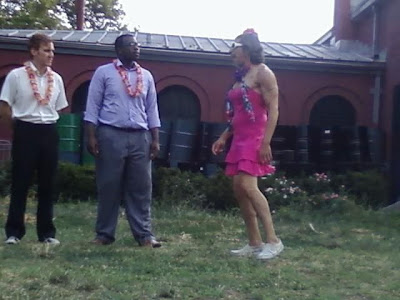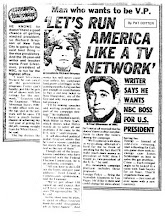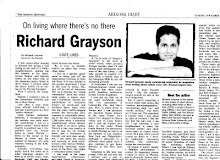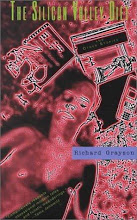
We had a Shakespeare-in-the-Brooklyn-Parks double header this afternoon, heading from Prospect Park's wonderful Julius Caesar to a delightfully wacky and surprisingly effective and affecting production of Much Ado About Nothing on the grass of McCarren Park.

The play, adapted and directed by Johnny Young, was presented by Black Henna Productions in an appropriately summery setting, Club Messina, a luxurious resort owned and operated by Leonato and his family. Audience members were given leis and the Hawaiian theme provided a great backdrop for the talented and comically adept cast.

Played on the grass between the dull, solid building that contains McCarren Park's filthy bathrooms and the Lorimer Street side near Nassau Evenue, it's a location that usually attracts sunbathers on summer weekend afternoons, and some of those already here, including one canoodling couple, stayed on for the show.

With the audience's beach blankets and picnic food (we got up during Act III and ran over to get lime ices from the nearby vendor, hardly missing a line), and even kids with big beach balls, the park setting was perfect for a Much Ado permeated with grass hula skirts, flowered shirts, drinks with little umbrellas. You could almost smell the suntan lotion in the air.

Although quite faithful to the text and plot of the play - unlike the recent New York Classical Theatre production, this one didn't eliminate the minor characters of Antonio (Cas Marino), Ursula (Regina Lim) and George Seacole (Ari Rivera) - this Much Ado About Nothing's resort milieu pretty much stripped characters like Leonato and Don Pedro of their gracious dignity, which proved rather refreshing.

The characters here seemed like regular people, none of them particularly attractive physically (not to insult the actors, who are perfectly pleasant-looking) and all of them at times imbued with a 21st-century American whiny petulance, a kind of hip-sitcom annoying nature that is really fun to watch in action.

The scheming, cellphone-distracted, predatory Don Joan (Dana Mazzenga) - Don John has been reimagined as a woman rather regularly - here is not as big a contrast with her good-time-Charlie brother Don Pedro (Isreal Scott), who's displaced her as CEO of AraGone Inc. (Aragon, get it?)

He's just a lot better-natured, keeps better company, and becomes friendlier when drunk on cocktails rather than meaner and more hostile and more manipulative.

For most of the play, the Friar (Drew Burke) sat among the audience under a beach umbrella on his own beach chair and blanket. Here reimagined as Club Messina's resident beach bum and spiritual guru, he shakes off his wasting-away-in-Margaritaville torpor to play his guitar and sing, offer some good advice, preside at weddings, and record the proceedings of the resort's inept security force, which under Dogberry (a very funny Ian McDonald) doubles as its lifeguards. The only lethal weapon the clueless Verges (Benjamin Thys) carries is his hair dryer.

The studied informality of this production worked nicely most of the time (on a few occasions, the actors stepped on each other's lines). Benedick (Jimmy O'Neill) and Beatrice (Amanda Doria) seem to have day-to-day responsibility for running the two corporations here for, respectively, Don Pedro and Beatrice's uncle Leonato (Kevin Schwab, nicely outfitted in a tropical-weight white suit, a soul patch and a sometimes-swinging golf club), and basically they're the most sensible characters at this beach resort - but they're not that sensible, although they're quick with insults (always pretty sensible, actually).

The play's most fortunate reinvention is making Antonio not Leonato's brother but his business partner and life partner. Cas Marino comes close to running away with the play in his portrayal of Antonio who's given to demurely adjusting his hot-pink dress at crucial moments. What's remarkable about Marino's performance is that he eschews easy laughs and broad comedy, and by the end there's the suggestion that he's the smartest one in the family.

Tim Robinson plays the sleaziest Borachio we've ever seen, but he's pretty well matched by Susan Erenberg's gum-chewing, rainbow-haired, headphoned Constance (as the "good twin" Margaret, she's more reserved but still slightly sleazy). With Mazzenga as Don Joan, their scenes are played fairly broadly, and their villainy is stupid enough to register as funny.

It was a relatively cool end for a very hot and humid July, but in the sun of the late afternoon, it was still a bit uncomfortable (we wished the cast had lent us some of the sunscreen they applied before the show began; the lei was nice, but the plastic around our neck made us hotter). Yet the audience stayed involved, including this little brother and sister. They couldn't possibly have understood a lot of what was going on, yet they were laughing regularly and seemed intently involved in the play.

Except for the funny chase scene by the Keystone Cops of Club Messina after the bad guys and the few characters who sat among us (notably the friar and Seacole and Dull, played by Mike Honda), the cast didn't wander into the audience. Working without scenery - although the hedges by the building in the back provided a good place for Benedick and Beatrice to listen in on conversations planned for their benefit - the action moved swiftly and we were surprised at how lucky they seemed to avoid the myriad distractions. (A momentary helicopter overhead, drowning out dialogue, was the worst offender, and that's nothing.)

As the ingenue couple whose marriage provides the MacGuffin for the comedy's goings-on (and the course of their on-again, off-again, pretending-to-be-dead, on-again romance doesn't really make sense except maybe as an alternate history for Romeo and Juliet), Melissa Meli as Hero

and Charley Layton as Claudio are jewels: very cute and sweet and even caring but, oh, are they stupid, each in their own way. But as with most of the characterization in this production, everything is just subtle enough to skirt ridiculousness.

We were afraid we might be a little too theater-weary for Much Ado in McCarren Park after coming from an earlier Shakespeare play, as well as an outdoor Cyrano last night, Medea the night before, and a play at Lincoln Center Out of Doors on Wednesday. But we weren't tired or bored for a minute at Black Henna Productions' performance.

Kudos to director Johnny Young, assistant director Malini Singh McDonald, stage manager Robert Babecki, costume designer Deborah Erenberg and everyone involved in bringing outdoor Shakespeare to Williamsburg and Greenpoint.











































































